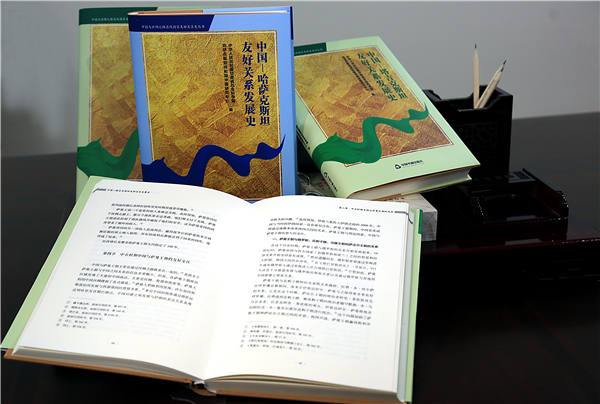

Relations with Tajikistan and Kazakhstan stretching back millennia documented, Chen Meiling and Ma Jingna report.
Two books telling the history of China-Tajikistan and China-Kazakhstan friendship, respectively, were released recently, aiming to boost mutual understanding and further exchanges among the public, the publishers say.
"Different from history books often compiled in a single country, the books were edited by think tanks from different countries, expecting to increase accuracy and receive recognition from all sides," said Wang Fusheng, president of the Gansu Academy of Social Sciences, publisher of the books, at the launch ceremony in Lanzhou, Gansu province, on Jan 5.
Exchanges between China and the two countries date back about 2,000 years, when merchants and camel caravans traveled along the Silk Road, he says.
The friendship was extended when China established diplomatic relations with the two countries in 1992 and is further promoted by the Belt and Road Initiative, with fruitful cooperation reached in the sectors of transportation, energy and agriculture, he adds.
The book about China-Kazakhstan history chronicled key events, figures and stories between Chinese and Kazak people, dating back from the early Qin Dynasty (221-206 BC) to modern times.
One chapter tells the story of the ancient Kingdom of Kangju, a powerful country in Central Asia, which is believed to have a close link to the historical origin of Kazak people. The kingdom had frequent exchanges with the Han Dynasty (206 BC-AD 220), according to written scripts on bamboo slips unearthed in Dunhuang of Gansu province.

The book, as quoted from the slips, tells stories about Kangju envoys bringing camels to a Han emperor as gifts and a Kangju king marrying off his daughter to the king of the North Huns. It also tells how huxuan dance from Kangju was popular in the court of the Tang Dynasty (618-907), in which women, in long dresses and colorful ribbons, stood with toes crossed and whirled to the beat of drums. "The art is similar to a Kazak dance now," the book says.
In another chapter, the book mentions prestigious Chinese musician Xian Xinghai (1905-1945), who once lived in Kazakhstan. In late 1940, Xian was sent to Moscow to join the production of a documentary. But the work was suspended due to World War II. After failing to return to China through Mongolia, Xian arrived in Kazakhstan's Alma-Ata in 1942, planning to return to China through the Xinjiang Uygur autonomous region, near Alma-Ata. The effort was in vain too.
Xian, a member of the Communist Party of China, used a fake name, Wang Shun, to avoid investigation by the Kuomintang, which regarded Xian as an illegal person. The Kuomintang had an embassy in Alma-Ata at the time, the book says.
While living in Alma-Ata, Xian met with local musicians, studied Kazak music and composed songs based on folk stories. He also joined rural concerts and played violin at villages. In 1944, he went to Kostanay of Kazakhstan as conductor of the local Philharmonic Orchestra. Xian died of severe pneumonia in Moscow in October 1945.
In 1998, the nameplate of former residence of Xian in Alma-Ata was unveiled when the presidents of Kazakhstan and China attended the ceremony. The street where the residence is located was then named Street of Xian Xinghai.
The book about China and Tajikistan first introduces the Samanid dynasty in the 9th to 10th century, an important period in Tajik history, and its exchanges with the Tang Dynasty.

Though records about the history between Samanids and the Tang Dynasty were rare, relics of Chinese silk, porcelain and paper were discovered in the region. Chinese craft skills, such as manufacturing pigments, silk-making and bronze work, were introduced to Central Asia; and the two built connections through marriage, according to the book.
It also says Samanids had a significant influence on Chinese ethic groups in the northwestern regions to accept Islam. Following parts of the book focus on bilateral cooperation in modern times such as trade, energy, telecommunications, science, culture and tourism.
Muhammad Egamzod, counselor of the embassy of Tajikistan in China, said at the book launch that people from the two countries established multisector exchanges during the ancient Silk Road period. And exploring the undiscovered chapters of the history will help enhance the friendly relations and benefit future cooperation.
Pronkina Olga from Russia, professor at the Gansu University of Political Science and Law in Lanzhou, says the book reveals less-known stories about Sino-Tajik relations, and how the governments worked together to build a close and reliable partnership.
The two books are part of a series of books about the history of friendly relations between China and countries along the Silk Road, published by the Gansu Academy of Social Sciences. Wang from the academy says multilingual version of the books, including those in Russian and English, will be published. The academy is also working with think tanks from Uzbekistan and Belarus to publish history books in the future.